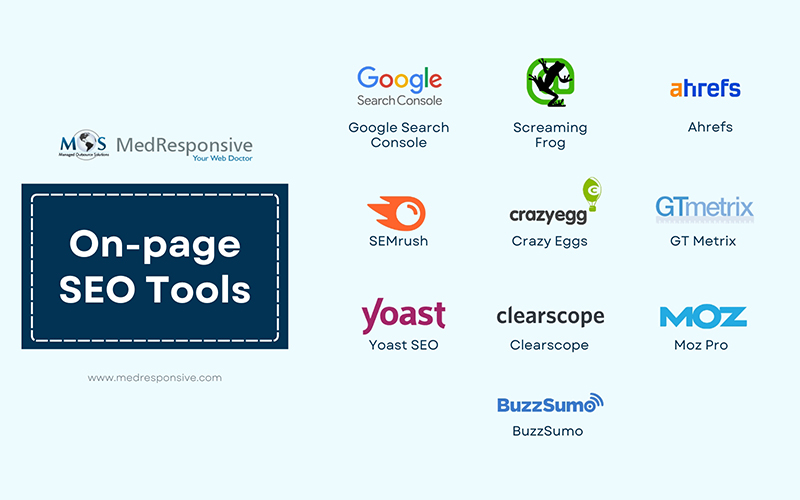In today’s competitive healthcare environment, having a website that stands out online is vital to succeed. Effective on-page SEO can make a significant difference, enabling your website to rank higher in search engines and attract more patients. Tools that assist in on-page optimization are critical for businesses seeking to maximize their visibility and impact. If you’re looking for ways to refine your website’s performance, SEO agencies for healthcare businesses can help you leverage the right SEO tools to achieve measurable results.
Importance of On Page SEO for Healthcare Websites
Effective on-page SEO optimization is crucial for healthcare businesses, as it ensures your website is search-engine-friendly, improves user experience, and helps drive targeted traffic to your site. By optimizing your pages with well-structured content and relevant keywords, you not only improve readability but also enhance the user experience, keeping visitors engaged. Additionally, optimized pages are more likely to rank higher in search results, driving increased traffic and attracting potential patients. Beyond visibility, on-page SEO also supports conversions by creating persuasive and user-friendly pages that guide visitors to take the desired actions, such as booking an appointment or contacting your practice.
Key on-page SEO elements include:
- Title Tags & Meta Descriptions – Crafting keyword-rich titles and descriptions improves click-through rates and search relevance.
- URL Structure – Clean, descriptive URLs enhance readability and search engine indexing.
- Header Tags (H1, H2, H3, etc.) – Organizing content with structured headings boosts readability and keyword optimization for healthcare sites.
- Keyword Optimization – Strategically placing relevant healthcare-related keywords improves search rankings.
- High-Quality Content – SEO for medical content relies on engaging, informative, and medically accurate content that establishes authority and credibility.
- Image optimization for medical websites – Using descriptive file names, alt text, and compressed images improve page load speed and accessibility.
- Internal Linking – Linking to relevant pages within the website helps users navigate and enhances SEO value.
- Mobile-Friendliness – Ensuring a responsive design provides a seamless experience across devices.
- Page Speed Optimization – Faster loading times reduce bounce rates and improve user satisfaction.
- Schema Markup – Adding structured data helps search engines understand and display key medical information effectively
Top 10 On-Page SEO Tools for Medical Website Optimization
As SEO continues to evolve, there are several on-page SEO tools available to improve your search engine ranking. But it is important to choose the tools and techniques wisely. SEO has become more complex which is due to the frequent changes in Google’s algorithm and most people keep basing their SEO strategies on outdated techniques. Understanding how to improve your healthcare website’s SEO with tools requires a strategic approach that focuses on optimizing both technical elements and content.
Best on-page SEO tools for healthcare websites include:
- Google Search Console: Earlier known as Webmaster Tools, Google Search Console is the best way to get feedback from Google about any red flag that your website has. The Coverage section helps to find out issues such as web pages that are not being crawled or blocked, 404 error, redirects, and duplicate content. It also lets you submit a URL for sitemap and make submission requests when individual URLs are removed by Google. This tool helps to examine the performance of the website according to the device used to connect to it – desktop, mobile etc. This is because Google favors mobile-friendly websites to cater to the increasing number of mobile users. Google Search Console also has additional tools to find out your website links profile, both external and internal, and keywords users use to find your website. It also alerts about security issues like hacked plugin that your CMS is using. Google Search Console is an ideal tool that helps webmasters and web owners get a clear understanding of the basics of their website and any related SEO problems.
- Screaming Frog: Screaming Frog offers a wide range of SEO tools and it has log file analyzer too, which is an overlooked part of SEO. Screaming Frog tool helps you to upload your server log files and analyze them as per various criteria. Similarly, if you find any files that are not being crawled, this tool lets you identify the problem with your website links to its own content that general SEO tools would not be able to find. It also helps find out bad bots that may be eating up your bandwidth or slowing down your website performance. This tool allows to find more about the various errors – 404 errors, errors based on timeouts and other permission issues. The Screaming Frog Log File Analyzer allows you to filter your own raw data about how to better optimize for search engines and human users alike.
- Ahrefs: Ahrefs is a robust on-page SEO tool renowned for its backlink analysis and extensive site audit capabilities. It enhances on-page SEO by offering detailed insights and actionable recommendations to optimize website performance. With features like rank tracking, keyword research, and competitor analysis, Ahrefs provides comprehensive support for improving search rankings. Its Site Explorer allows users to analyze specific URLs, uncovering essential details needed for better ranking. Key features include Site Audit for identifying and resolving SEO issues, Keyword Explorer for targeting high-value keywords, Content Gap Analysis to find opportunities to outperform competitors, and Rank Tracker to monitor keyword performance over time.
- SEMrush: SEMrush is a robust SEO platform renowned for its comprehensive SEO analysis capabilities, making it an invaluable asset for marketers aiming to optimize their websites. It offers a wide range of tools, including detailed keyword research, site audits, and competitive analysis, which enable users to effectively evaluate and enhance their SEO strategies. Key features such as the On-Page SEO Checker provide actionable recommendations to improve on-page elements, the Keyword Magic Tool offers in-depth keyword research capabilities, and Traffic Analytics helps analyze competitors’ traffic sources. Also, SEMrush has an extensive keyword database, comprehensive reporting capabilities, and regular updates on the latest SEO trends. However, its higher pricing tiers may be restrictive for small businesses, and the platform’s extensive functionality can present a learning curve for new users.
- FAQFox: Creating valuable content that highlights your Experience, Expertise, Authoritativeness, and Trustworthiness (E-E-A-T) is a great way to engage online users and establish credibility with Google. Since E-E-A-T plays a key role in assessing page quality, aligning your content with these principles can enhance visibility. One useful free on-page SEO tool for content ideation is WebFX’s FAQFox. It scans online forums and searches to identify common questions your audience is asking, helping you generate relevant blog topics.
- Crazy Eggs: They were the first ones to come up with heat mapping to the wider internet. Heat mapping is a way of following the user experience of a website with eye tracker to monitor where the user focus is on the page. Though heat mapping is not an SEO tool technically, it has interest in SEO circles because of its overlap with on-page design and development for general SEO and marketing purposes. A notable aspect of heat mapping is that audiences are generally drawn to the top left section of the page content. This is because we are used to reading from left to right in English, and therefore this is the area that marketers like to aim to place their CTAs. But for SEO purposes, it needs an in-depth analysis, especially in terms of the correct placement of navigation link. Crazy Eggs provides heat mapping services and offer heatmaps, scroll maps, and click reports. This allows SEOs to better apply content and CTAs, and this provides better insights when it comes to website analytics tools.
- GT Metrix: This tool can make website speed optimization for healthcare sites easier. It not just shows you the page load speed but also offers suggestions and improvement areas. It uses a combination of Google Page Speed Insights and YSlow Insight to churn out scores and speed improvement suggestions that are practical and easy to follow.
- Moz Pro: Moz Pro combines a user-friendly design with robust SEO features, making it suitable for users of all skill levels. Known for its strong keyword tracking capabilities, it offers valuable metrics and insights to improve website performance. Key features include the Keyword Explorer, which identifies new keyword opportunities, Link Research for analyzing backlinks and gaining a competitive edge, and an On-Page Grader that delivers actionable insights for optimizing individual web pages. While Moz Pro offers a comprehensive resource library and intuitive interface, it has limitations in lower-priced tiers and may lack depth in some advanced features.
- Yoast SEO: It is a top choice for WordPress users seeking effective on-page SEO optimization. Known for its user-friendly interface, it simplifies complex SEO tasks, making it accessible even for non-technical users. Key features include keyword optimization to refine content for target keywords, a readability check to enhance text clarity, and a snippet preview to visualize how titles and descriptions will appear in search results. While its free version offers comprehensive on-page optimization features, the premium version provides additional functionality for users willing to invest. Regular updates with the latest SEO guidelines ensure that Yoast SEO remains a reliable tool for improving website performance.
- Keyword Surfer: This tool generates related keyword suggestions and insights. Keyword research is a crucial step for both on-page SEO and your overall healthcare SEO strategy. Keyword Surfer offers valuable keyword data directly within search results. As a Chrome browser extension, it provides real-time keyword metrics in the SERPs and suggests related keywords, helping you expand your keyword list and optimize your site’s content effectively.
Healthcare SEO is long-term strategy and you cannot expect to see results overnight. No businesses have any control over Google or its algorithm. Keeping an eye on the latest trends and evaluating and planning for the future could help gain positive results. Using the above-mentioned tools, you can optimize your website and improve your ranking. There are also platforms that you can use to increase traffic and brand awareness greatly. Companies specializing in SEO for doctors and healthcare providers are skilled in optimizing websites for search engine algorithms and rankings, helping your healthcare site reach the top of search results page.





